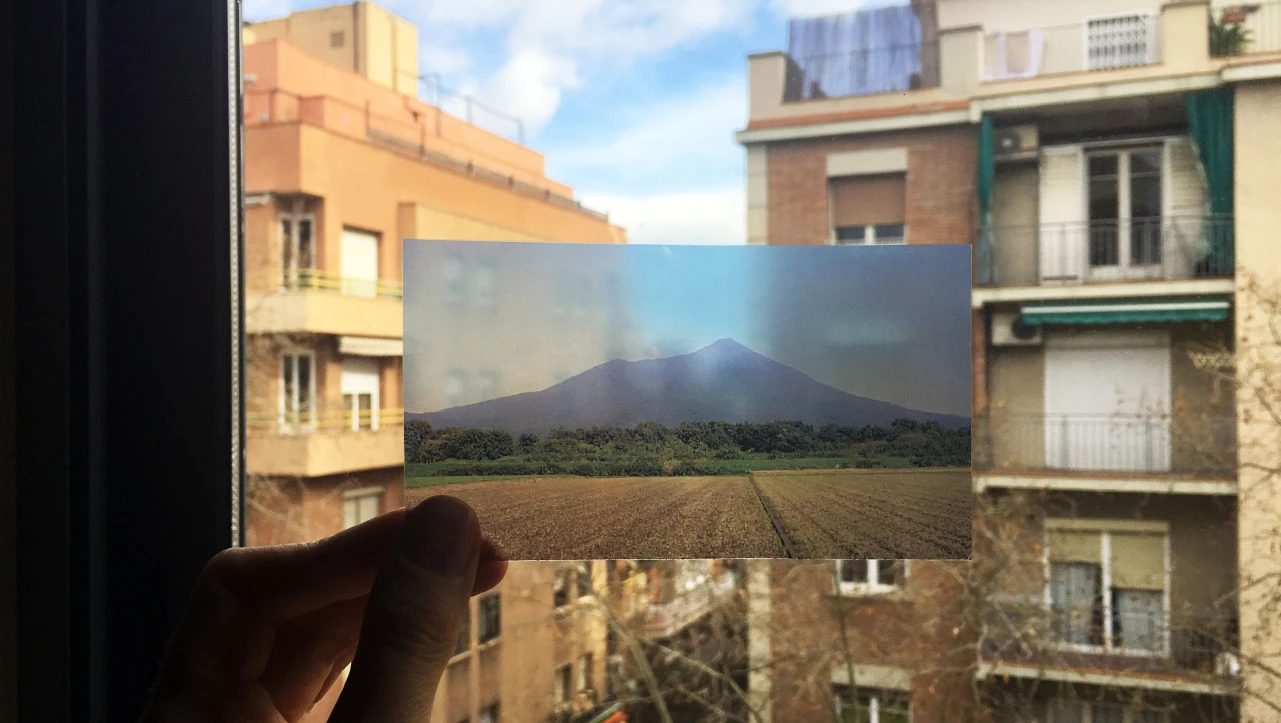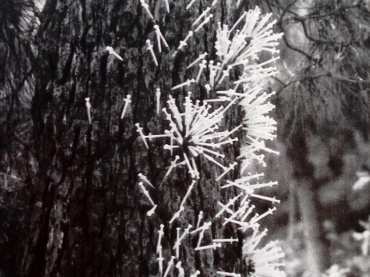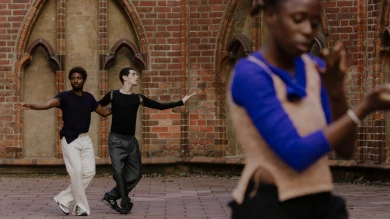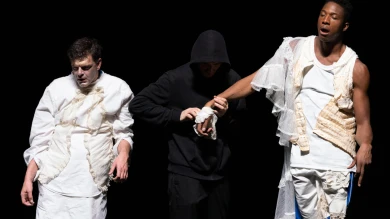Collective Mourning and Planetary Mourning

Held on 11 Nov 2022
Collective Mourning and Planetary Mourning is the title under which a set of activities are set in motion around the echo of activities celebrating All Souls Day with a programme of live arts, before continuing with a study group under the same name. It seeks to open up a dialogue around mourning as a human process of loss and mourning established by the world through reflections from artistic forms of expression, social movements and environmental activism.
The helplessness experienced in the death of thousands of people during the recent global pandemic, in addition to successive and current wars, exists alongside a growing sadness over environmental collapse and the destruction of life on Earth. In this context of social disturbance, forms of rituality and collective care arise, inviting us to reflect on the power of mourning to reshape relationships with the world.
In contemporary Western societies there is the prevailing conception of mourning as the process an individual must go through after the loss of affective ties to those who have passed. This acceptance, imposed as work based on the exercise of forgetting, is revised by Vinciane Despret in her book Our Grateful Dead. Stories of Those Left Behind (University of Minnesota Press, 2021). In it, Despret gathers the testimonies of lived experiences during mourning, and suggests we listen and tend to other forms of existence in our relationships with those who are no longer here. Gestures, behaviours and unusual attentions that can lead to mourning not being conceived negatively as an anomaly that we must cure ourselves of, but as a state which is able to perceive and house modes of uncommon co-existence between people, times, spaces and beings.
[dropdown]
Drawing inspiration from these ideas, the programme starts by setting forth a critical questioning of the conception of mourning as individual experience, addressing the collectiveness of life and the conditions and categorisation of the sick body. It prompts a study of present issues in situated ecologies — for instance analogies between ways of life — so as to observe the tensions or conflicts that stem from them. The question around whether it is possible, as a society, to imagine and put into practice gestures that nurture a more just co-existence between humans and other species — animals, plants and minerals — and which also dissociate themselves from the established relations of consumption, destruction or domination, form the backbone of the overall intention of Collective Mourning and Planetary Mourning.
Collective Mourning and Planetary Mourning’s live arts programme is held in collaboration with the Community of Madrid’s 40th Autumn Festival and features the screening of the stage piece MONUMENT 0.6: Heterochrony, by Eszter Salamon, and the performance of Alex Baczyński-Jenkins’s dance piece Unending love, or love dies, on repeat like it’s endless. The project occasions experimentation with a sensitive approach to choreographic pieces and other physical practices which contend with different states of transit between life and death: the multiple and complex forms of mutual care; support for different states of mind stemming from loss; the invention of our own corporal or symbolic ritualisms which, upon being shared, resignify and establish new relational forms with life; and, finally, mourning as a state for perception and listening.
Furthermore, the Museo’s study group is articulated around six sessions grouped into two blocks, whereby artists and researchers who work in different fields of knowledge — Alejandro Alonso Díaz, Marwa Arsanios, Rebecca Collins, María García Ruiz, Germán Labrador, José Antonio Sánchez, Alejandro Simón and Leire Vergara — are invited to share their investigations, readings, experiences and artworks, with the aim of cultivating a terrain of reflection and debate around mourning. It also follows on from the study groups previously coordinated by the research group Artea — Body, Territory and Conflict (2020–2021) and Conjugating Worlds: Multi-Species Corporealities (2022) — and is linked to the research project The New Loss of Centre. Critical Practices of Live Arts and Architecture in the Anthropocene, directed by Fernando Quesada, from the University of Alcalá de Henares, and funded by Spain’s Ministry of Science and Innovation.
[/dropdown]
Curator
Isabel de Naverán (ARTEA)
Organised by
Museo Reina Sofía
Collaboration
The Community of Madrid’s Autumn Festival
Inside the framework of
TIZ 5. Phantasmata and TIZ 6. Planet A: Green World
-
Friday, 11 November 2022 Nouvel Building, Auditorium 200
Collective Mourning and Planetary Mourning. MONUMENT 0.6: Heterochrony
Eszter Salamon
TicketsThe Museo organises Collective Mourning and Planetary Mourning, with a live arts programme which participates in the 40th Autumn Festival of Madrid. The first part features the performance of MONUMENT 0.6: Heterochrony, a stage piece by Hungarian choreographer Eszter Salamon, who creates an imaginary scene between past and present. The work also includes echoes of music archives from Sicily with choreographic impressions inspired by the mummification rituals of the Capuchin Catacombs of Palermo, presenting a continuum between life and death, a phantasmagorical co-existence, while inventing its own utopian body: a dancing, acoustic body. The performance is followed by a conversation between Eszter Salamon, Isabel de Naverán, Germán Labrador and Alberto Conejero.

-
Saturday, 12, and Sunday, 13 November 2022 Sabatini Building, Floor 1, Room 102
Collective Mourning and Planetary Mourning. Unending love, or love dies, on repeat like it's endless
Alex Baczyński-Jenkins
TicketsThe second part of the Collective Mourning and Planetary Mourning programme presents the performance Unending love or love dies, on repeat like it's endless, a choreography by Alex Baczyński-Jenkins which explores relationships between desire, dance, fragmentation, love (understood as communality), mourning and time. Through the gesture, sensuality, relationality and touch, Baczyński-Jenkins’s practice unfurls structures and politics of desire. Relationality is present in the dialogic forms of developing and performing the piece, and in the materials and poetics it invokes. This includes the study of the relationships between feeling and sociability, embodied expression and alienation, the textures of daily experiences and latent queer utopian legacies.

-
20 December 2022 - 26 January 2023
Collective Mourning and Planetary Mourning
Study Group
RegistrationThis study group ties in with the same-titled live arts programme. Across six sessions, artists and researchers share their investigations, readings, experiences and artistic references, contributing to an enrichment of reflections and debates which set up a dialogue with mourning a process of human loss and the mourning engendered by the gradual destruction of the planet. In this context of social disturbance, forms of rituality and collective care arise, inviting us to reflect on the potential of mourning to reshape relationships with the world.

Más actividades
![Tracey Rose, The Black Sun Black Star and Moon [La luna estrella negro y negro sol], 2014.](https://recursos.museoreinasofia.es/styles/small_landscape/public/Obra/AD07091_2.jpg.webp)
On Black Study: Towards a Black Poethics of Contamination
Monday 27, Tuesday 28 and Wednesday 29 of April, 2026 – 16:00 h
The seminar On Black Study: Towards a Black Poethics of Contamination proposes Black Study as a critical and methodological practice that has emerged in and against racial capitalism, colonial modernity and institutional capture. Framed through what the invited researcher and practitioner Ishy Pryce-Parchment terms a Black poethics of contamination, the seminar considers what it might mean to think Blackness (and therefore Black Study) as contagious, diffuse and spreadable matter. To do so, it enacts a constellation of diasporic methodologies and black aesthetic practices that harbor “contamination” -ideas that travel through texts, geographies, bodies and histories- as a method and as a condition.
If Blackness enters Western modernity from the position of the Middle Passage and its afterlives, it also names a condition from which alternative modes of being, knowing and relating are continually forged. From within this errant boundarylessness, Black creative-intellectual practice unfolds as what might be called a history of touches: transmissions, residues and socialities that unsettle the fantasy of pure or self-contained knowledge.
Situated within Black radical aesthetics, Black feminist theory and diasporic poetics, the seminar traces a genealogy of Black Study not as an object of analysis but as methodological propositions that continue to shape contemporary aesthetic and political life. Against mastery as the horizon of study, the group shifts attention from what we know to how we know. It foregrounds creative Black methodological practices—fahima ife’s anindex (via Fred Moten), Katherine McKittrick’s expansive use of the footnote, citation as relational and loving labour, the aesthetics of Black miscellanea, and Christina Sharpe’s practices of annotation—as procedures that disorganise dominant regimes of knowledge. In this sense, Black Study is approached not as a discrete academic field but as a feel for knowing and knowledge: a constellation of insurgent practices—reading, gathering, listening, annotating, refusing, world-making—that operate both within and beyond the university.
The study sessions propose to experiment with form in order to embrace how ‘black people have always used interdisciplinary methodologies to explain, explore, and story the world.’ Through engagements with thinkers and practitioners such as Katherine McKittrick, C.L.R. James, Sylvia Wynter, Christina Sharpe, Fred Moten, Tina Campt, Hilton Als, John Akomfrah, fahima ife and Dionne Brand, we ask: What might it mean to study together, incompletely and without recourse to individuation? How might aesthetic practice function as a poethical intervention in the ongoing work of what Sylvia Wynter calls the practice of doing humanness?

Intergenerationality
Thursday, 9 April 2026 – 5:30pm
This series is organised by equipoMotor, a group of teenagers, young people and older people who have participated in the Museo Reina Sofía’s previous community education projects, and is structured around four themed blocks that pivot on the monstrous.
The third session gazes at film as a place from which to dismantle the idea of one sole history and one sole time. From a decolonial and queer perspective, it explores films which break the straight line of past-present-future, which mix memories, slow progress and leave space for rhythms which customarily make no room for official accounts. Here the images open cracks through which bodies, voices and affects appear, disrupting archive and questioning who narrates, and from where and for whom. The proposal is at once simple and ambitious: use film to imagine other modes of remembering, belonging and projecting futures we have not yet been able to live.

Remedios Zafra
Thursday March 19, 2026 - 19:00 h
The José Luis Brea Chair, dedicated to reflecting on the image and the epistemology of visuality in contemporary culture, opens its program with an inaugural lecture by essayist and thinker Remedios Zafra.
“That the contemporary antifeminist upsurge is constructed as an anti-intellectual drive is no coincidence; the two feed into one another. To advance a reactionary discourse that defends inequality, it is necessary to challenge gender studies and gender-equality policies, but also to devalue the very foundations of knowledge in which these have been most intensely developed over recent decades—while also undermining their institutional support: universities, art and research centers, and academic culture.
Feminism has been deeply linked to the affirmation of the most committed humanist thought. Periods of enlightenment and moments of transition toward more just social forms—sustained by education—have been when feminist demands have emerged most strongly. Awareness and achievements in equality increase when education plays a leading social role; thus, devaluing intellectual work also contributes to harming feminism, and vice versa, insofar as the bond between knowledge and feminism is not only conceptual and historical, but also intimate and political.
Today, antifeminism is used globally as the symbolic adhesive of far-right movements, in parallel with the devaluation of forms of knowledge emerging from the university and from science—mistreated by hoaxes and disinformation on social networks and through the spectacularization of life mediated by screens. These are consequences bound up with the primacy of a scopic value that for some time has been denigrating thought and positioning what is most seen as what is most valuable within the normalized mediation of technology. This inertia coexists with techno-libertarian proclamations that reactivate a patriarchy that uses the resentment of many men as a seductive and cohesive force to preserve and inflame privileges in the new world as techno-scenario.
This lecture will address this epochal context, delving into the synchronicity of these upsurges through an additional parallel between forms of patriarchal domination and techno-labor domination. A parallel in which feminism and intellectual work are both being harmed, while also sending signals that in both lie emancipatory responses to today’s reactionary turns and the neutralization of critique. This consonance would also speak to how the perverse patriarchal basis that turns women into sustainers of their own subordination finds its equivalent in the encouraged self-exploitation of cultural workers; in the legitimation of affective capital and symbolic capital as sufficient forms of payment; in the blurring of boundaries between life and work and in domestic isolation; or in the pressure to please and comply as an extended patriarchal form—today linked to the feigned enthusiasm of precarious workers, but also to technological adulation. In response to possible resistance and intellectual action, patriarchy has associated feminists with a future foretold as unhappy for them, equating “thought and consciousness” with unhappiness—where these have in fact been (and continue to be) levers of autonomy and emancipation.”
— Remedios Zafra

ARCO2045. The Future, for Now
Saturday 7, March 2026 - 9:30pm
The future, its unstable and subjective nature, and its possible scenarios are the conceptual focus of ARCOmadrid 2026. A vision of the future linked to recent memory, a flash of insight into a double-edged sword. This year's edition, as in the previous two, will once again hold its closing party at the Reina Sofia Museum. This time, the star of the show is Carles Congost (Olot, Girona, 1970), one of the artists featured in the new presentation of the Collections recently inaugurated on the 4th floor of the Sabatini Building.
Carles Congost, with his ironic and timeless gaze, is responsible for setting the tone for this imperfect future, with a DJ session accompanied by some of his works in the Cloister on the first floor of the Sabatini Building of the Museo on the night of Saturday 7 March.

27th Contemporary Art Conservation Conference
Wednesday, 4, and Thursday, 5 March 2026
The 27th Contemporary Art Conservation Conference, organised by the Museo Reina Sofía’s Department of Conservation and Restoration, with the sponsorship of the Mapfre Foundation, is held on 4 and 5 March 2026. This international encounter sets out to share and debate experience and research, open new channels of study and reflect on conservation and the professional practice of restorers.
This edition will be held with in-person and online attendance formats, occurring simultaneously, via twenty-minute interventions followed by a five-minute Q&A.

